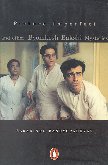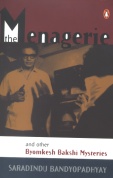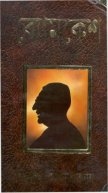
|
Related Articles: # Pragjyotish (Before the stars could foretell) (short story)
Books by Saradindu Bandyopadhyay (incomplete list)  # The Picture Imperfect (tr. in English)  # The Menagerie and Other Byomkesh Bakshi Mysteries (tr. in English) # The Scarlet Dusk (tr. in English) # Byomkesh Bakshi Stories(tr. in English)  # Byomkesh Samagro  # Oitihasik Kahini Samagro # Galpa-Sangraha # 10-ti Uponyas # Tungobhadrar Teer-e # Natok o Chitranatya Sangraha # Tungobhadrar Teer-e # Bhumikomper Patabhumi
For Books by Saradindu Bandyopadhyay and Others, visit |

 Saradindu Bandyopadhyay (1899 - 1970) Saradindu Bandyopadhyay (1899 - 1970)
Saradindu Bandyopadhyay was born in Purnea, Bihar[*] on March 30, 1899 where his father was posted, although his ancestral home was in Baranagar, in north Kolkata. He completed his matriculation in 1915 from a school in Mungher, after which he joined the Vidyasagar College in Kolkata. Sisir Bhaduri, the doyen of Bengali stage, was his English professor there. After graduation, he went on to study law in Patna. He was thirty when he gave up his practice and started working as a writer. In 1928, Himangshu Roy invited him to Bombay to write screenplays. Till 1952 he wrote for films, and then settled down in Pune to pursue a full-fledged career as a writer.
Saradindu Bandyopadhyay's repertoire was varied. He was equally at ease with short and long stories. He is primarily known as the creator of Byomkesh Bakshi, the quintessential Bengali detective, whose exploits touched the hearts of not just Bengali readers, but through translations, TV and cinema, of people across India and beyond.
The literary brilliance of his historical fiction remains unparalleled. Set in different periods of Indian history, right from the Pre-Aryan days to the Gupta, Mauryan era till the age of the Mughals — they are a unique blend of scintillating twists and turns, of romance, adventure, characterisations brought to life by a unique idiom and vocabulary to suit the ethos of that bygone era.
Some of his novels in this genre are Gourmalhar, Tungabhadra’r Teere, Kaler Mandira and Jheender Bandi. The last one was Saradindu’s adaptation of Anthony Hope’s The Prisoner of Zenda and was later adapted on screen by the noted director, Tapan Sinha. Uttam Kumar and Anjana Bhowmik played the lead pair in yet another screen adaptation – Rajdrohi. About his writings in this genre – Saradindu himself had emphasised – ‘my stories are not fictionalised history, they are historical fiction.’
Two of the other prominent characters fathered by Saradindu are Sadashiv and Barada. The former is a child hero, and his adventures are a delightful treat for the young readers. Since the writer spent the latter half of his life in Maharashtra, Pune and the Western Ghats form a picturesque backdrop to quite a few of his stories, many of which narrate tales of the Maratha hero, Chhatrapati Shivaji.
Barada, on the other hand, is a ghost-chaser, obsessed with life-after death. He recounts his many encounters with spirits much to the chagrin of his friends. This series of short stories provide great examples of spine-chilling atmosphere and last minute twists.
Saradindu's books continue to be among the bestsellers in Bengali literature, primarily because of the unabated popularity of his detective Byomkesh. Satyajit Ray had filmed the story “Chiriakhana” with the superstar Uttam Kumar playing the lead. Recently, director Anjan Dutta has adapted the story “Aadim Ripu” for his cinematic version of “Byomkesh Bakshi.”
Saradindu breathed his last on September 22, 1970. Noted author Sunil Gangyopadhyay said of him: "[...]Among contemporary writers of Bengali – nobody could write a historical fiction quite like him. Who can create that atmosphere, who else has the wit and humour…his prose had a different taste altogether – I am rather fond of it...."
[*]
However, according to Barid Baran Ghosh (Desh May 11,1999, Saradindu centenary issue), Saradindu was
born in Jaunpur ("Juktopradesher Jaunpur") – where his maternal grandfather was posted.
Published January, 2011.
Click here to send your feedback
* To learn more about the ITRANS script for Bengali, click here. |
©Parabaas, 2011

.